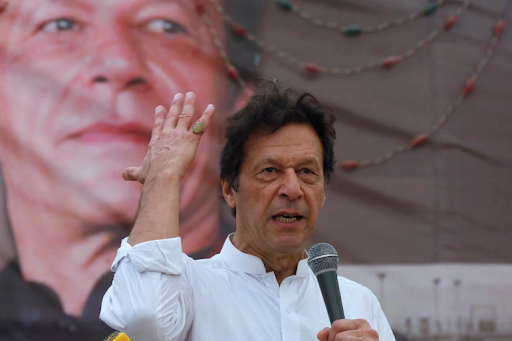Pakistan’s Prime Minister Faces No-Confidence Motion After Military Revokes Support
Prime Minister Imran Khan photographed at a jalsa (political rally). Photo: Akhtar Soomro/Reuters
Pakistan’s Prime Minister Imran Khan is facing pressure to resign from office through a motion of no-confidence initiated by the political opposition and supported by Pakistan’s army; the latter holding immense influence over the nation’s government affairs.
The PM has been consistently blamed for Pakistan’s crumbling economy during his rule, the deterioration of diplomatic ties with foreign powers, the alleged corruption taking place among senior government officials, and more recently, his aggressive remarks towards dissidents of his party. Along with opposing political parties, members of Khan’s own party, Pakistan Tehreek-e-Insaf (PTI), have spoken out against him and publicly voiced support for the motion of no-confidence against Khan.
A motion of no-confidence, according to the Constitution of Pakistan, is a resolution that if passed against the premier, results in the premier resigning from office, along with his entire cabinet also being dissolved. Subsequently, the National Assembly has to immediately vote and elect a new leader. The vote of no-confidence can only be passed if the majority of the total membership of the lower house of Parliament votes in favor of the motion.
Due to Khan’s government repeatedly facing heavy criticism from the Pakistani people in conjunction with disapproval from opposing parties, the PM is no stranger to public pressure and judgment. Usually Khan displays a coy and self-assured demeanor when addressing his critics, emphasizing his dedication to reforming Pakistan into a corruption-free, economically stable, self-sufficient nation that he hopes will one day transform into a safe haven for women and children. However, his idealistic views have been deemed impractical by many of his critics who urge him to address the plethora of problems that the average Pakistanis are facing in their day to day lives, particularly the country’s imminent inflation problem.
Although Pakistan’s economy was worsening even before Khan came to power, the country reached unprecedented heights of inflation under his leadership, officially making it the country with the highest rates of inflation in South Asia. According to the Pakistan Bureau of Statistics, the country’s consumer price index has risen to 13 percent while the sensitive price index, which includes food items and other essential commodities, has reached a high of 15.1 percent. Due to these record high levels of inflation, middle and low-income Pakistanis are struggling to make ends meet while their quality of life is substantially deteriorating.
Despite his shortcomings, Khan was able to keep his position in power for the last few months due to the Pakistani Army’s support. However, the military recently changing its stance to neutral on the no-confidence motion has made the PM an easy target for the country’s largest opposition parties– and they are not holding back.
PM Khan and Army Chief Bajwa meet in Islamabad. Photo: Dawn News
“In terms of the security establishment, my sense is that the relationship between Mr. Khan and the army chief has taken a nosedive since their spat over the new head of the ISI,” claimed deputy director of the Asia program at the Wilson Center, Michael Kugelman. He further stated that “Given how things work in Pakistan, if you are the prime minister and your relationship with the army chief takes a tumble then it makes your political position much more vulnerable.”
The military distancing itself from Khan’s government can be linked to the ex-PM Nawaz Sharif’s controversial remarks made in a speech in 2020, in which he boldly accused the army of manufacturing Khan’s rise to power. “...You packed up our government, which was working well, and put the nation and the country at the altar of your wishes,” said Sharif in reference to Gen Qamar Javed Bajwa, Pakistan’s Chief of Army. Such accusations caused tensions and mistrust between the nation’s public and Khan’s government, due to Pakistanis generally disapproving of the military’s interference in political affairs.
Various factors ranging from economic turmoil and political mismanagement, to the army’s disapproval of certain measures taken by Khan in dealing with its neighbor and longtime rival India, can be considered reasons for why the opposition can potentially secure enough votes in their motion of no-confidence to oust Imran Khan as Pakistan’s prime minister.


